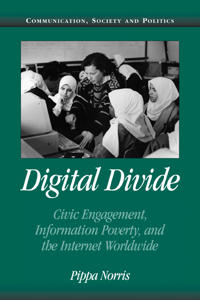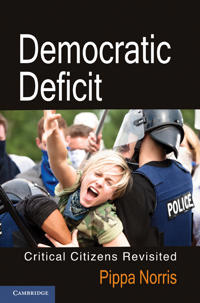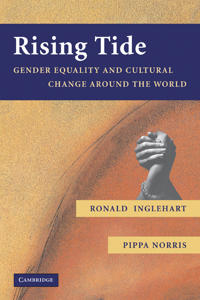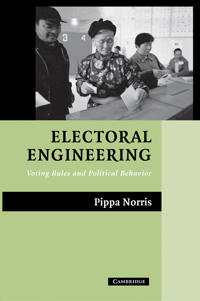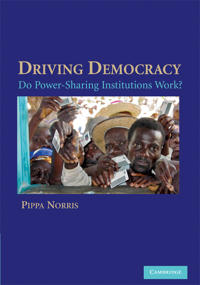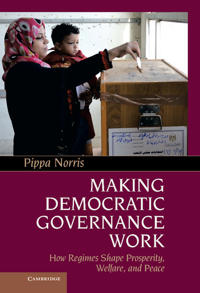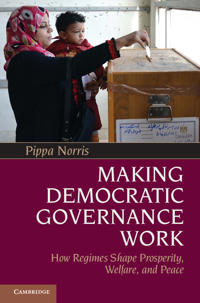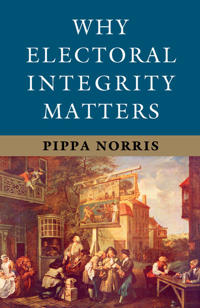Cosmopolitan Communications (Pocket)
avPippa Norris, Ronald Inglehart, Pippa Norris
ISBN: 9780521738385 - UTGIVEN: 200908Societies around the world have experienced a flood of information from diverse channels originating beyond local communities and even national borders, transmitted through the rapid expansion of cosmopolitan communications. For more than half a century, conventional interpretations, Norris and Ingl[...]
Sacred and Secular (Pocket)
avPippa Norris, Ronald Inglehart, Pippa Norris
ISBN: 9781107648371 - UTGIVEN: 201110This book develops a theory of existential security. It demonstrates that the publics of virtually all advanced industrial societies have been moving toward more secular orientations during the past half century, but also that the world as a whole now has more people with traditional religious views[...]
Advancing Electoral Integrity (Häftad)
avPippa Norris
ISBN: 9780199368716 - UTGIVEN: 2014-05Recent decades have seen growing concern about problems of electoral integrity. The most overt malpractices used by rulers include imprisoning dissidents, harassing adversaries, coercing voters, vote-rigging counts, and even blatant disregard for the popular vote. Serious violations of human rights,[...]
Digital Divide (Pocket)
avPippa Norris
ISBN: 9780521002233 - UTGIVEN: 2001-09There is widespread concern that the growth of the Internet is exacerbating inequalities between the information rich and poor. Digital Divide examines access and use of the Internet in 179 nations world-wide. A global divide is evident between industrialized and developing societies. A social divid[...]
Democratic Phoenix (Häftad)
avPippa Norris
ISBN: 9780521010535 - UTGIVEN: 2002-09Conventional wisdom suggests that citizens in many countries have become disengaged from the traditional channels of political participation. Commentators highlight warning signs including sagging electoral turnout, rising anti-party sentiment, and the decay of civic organizations. But are these con[...]
Democratic Deficit (Pocket)
avPippa Norris
ISBN: 9780521127448 - UTGIVEN: 201102Many fear that democracies are suffering from a legitimacy crisis. This book focuses on 'democratic deficits', reflecting how far the perceived democratic performance of any state diverges from public expectations. Pippa Norris examines the symptoms by comparing system support in more than fifty soc[...]
Rising Tide (Häftad)
avRonald Inglehart, Pippa Norris
ISBN: 9780521529501 - UTGIVEN: 200304The twentieth century gave rise to profound changes in traditional sex roles. However, the force of this ârising tideâ has varied among rich and poor societies around the globe, as well as among younger and older generations. Rising Tide sets out to understand how modernization has changed[...]
Electoral Engineering (Häftad)
avPippa Norris
ISBN: 9780521536714 - UTGIVEN: 200402From Kosovo to Kabul, the last decade witnessed growing interest in ?electoral engineering?. Reformers have sought to achieve either greater government accountability through majoritarian arrangements or wider parliamentary diversity through proportional formula. Underlying the normative debates are[...]
Radical Right (Häftad)
avPippa Norris
ISBN: 9780521613859 - UTGIVEN: 200508During recent decades, radical right parties have been surging in popularity in many nations, gaining legislative seats, enjoying the legitimacy endowed by ministerial office, and striding the corridors of government power. The popularity of leaders such as Le Pen, Haider, and Fortuyn has aroused wi[...]
Driving Democracy (Häftad)
avPippa Norris
ISBN: 9780521694803 - UTGIVEN: 200808Proposals for power-sharing constitutions remain controversial, as highlighted by current debates in Iraq, Afghanistan, Nepal, and Sudan. This book updates and refines the theory of consociationalism, taking account of the flood of contemporary innovations in power-sharing institutions that have occ[...]
Making Democratic Governance Work (Inbunden)
avPippa Norris
ISBN: 9781107016996 - UTGIVEN: 2012-08Is democratic governance good for economic prosperity? Does it accelerate progress towards social welfare and human development? Does it generate a peace-dividend and reduce conflict at home? Within the international community, democracy and governance are widely advocated as intrinsically desirable[...]
Making Democratic Governance Work (Pocket)
avPippa Norris
ISBN: 9781107602694 - UTGIVEN: 201208Is democratic governance good for economic prosperity? Does it accelerate progress towards social welfare and human development? Does it generate a peace-dividend and reduce conflict at home? Within the international community, democracy and governance are widely advocated as intrinsically desirable[...]
Why Electoral Integrity Matters (Häftad)
avPippa Norris
ISBN: 9781107684706 - UTGIVEN: 2014-06This book is the first in a planned trilogy by Pippa Norris on challenges of electoral integrity to be published by Cambridge University Press. Unfortunately too often elections around the globe are deeply flawed or even fail. Why does this matter? It is widely suspected that such contests will unde[...]
Passages to Power (Pocket)
avPippa (EDT) Norris
ISBN: 9780521599085 - UTGIVEN: 1997-10Recruitment to legislative office is one of the core functions of political systems, yet we know little about how the process varies from one country to another. Passages to Power provides a comparative account of legislative recruitment which applies a common analytical framework and new survey dat[...]




